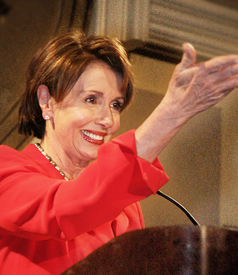Support justice-driven, accurate and transparent news — make a quick donation to Truthout today!
On the second day of closed door meetings with President Obama, House Speaker Nancy Pelosi said Congressional Democrats are nearing agreement on a merger of the Senate and House health care bills into a comprehensive piece of legislation.
“We’ve had a very intense couple of days,” Pelosi told reporters following the White House meeting. “I think we are very close to reconciliation, respectful of the challenges.”
Democratic members face opposition from a unified Republican front, and need every member of their 60-vote Senate coalition on board to pass the bill. This pushes the final version of the health care legislation closer to the Senate’s proposals to garner the minimum Democratic votes needed – a struggle throughout Obama’s health care negotiations.
“There’s so much agreement in the bills but sometimes we approach the issue differently, so we have to figure out the best approach,” Pelosi said.
A House aide quoted by Reuters said that there are more than two dozen issues to be resolved, with House leaders aiming to finish discussion prior to Obama’s State of the Union address, scheduled for early February.
“We’re in a can-do mood,” Rep. Xavier Becerra (D-California) told reporters after a meeting in Pelosi’s office.
House Democratic leaders plan to talk to other members by phone Thursday, following two days of meetings with Pelosi and Obama in the informal Congressional decision-making style known as ping-ponging. This entails sending the bill back-and-forth between the House and Senate chambers, with each adding additional modifications until a final version is agreed upon.
Both the Senate and House versions would require the majority of Americans to purchase insurance, offer subsidies to cover the cost and create the option for people to compare and choose different plans.
The more contentious issues of the debate center around federal funding of abortion, the use of taxation to pay for additional costs introduced by the health care bill, the option of a government-run insurance program and penalties for uninsured Americans.
Pelosi has previously said the House could live without a public option or government-run insurance plan, but challenged the Senate to offer something better. The offering of a public option has been one of the most stark differences in the two bills.
“Our priority on the public option, the emphasis was not on ‘public’ – the emphasis was on ‘option,’ on something ‘other than,'” she said. “The president said from the start, ‘I believe that the public option is the best way to keep the insurance companies honest and increase competition. If you have a better idea, put it on the table … So we will see what they have on the table.”
Critics such as Dr. Quentin Young, of Physicians for a National Health Program, see a public insurance plan as having been sacrificed for conservative Democratic votes. “We are very dissatisfied with the way the end of stage negotiations are going,” he said. “It seems to use from the very first day the administration has made concessions to the conservative wing who dominates the Senate.”
Young, recently retired from his 61 years in medical practice to be the national coordinator for PNHP, was the personal physician to Martin Luther King Jr. during his stay in Chicago, a partner at the physician’s office that Obama attended for 22 years and was also friends with the then-community-organizer.
“I had many conversations with him and I can tell you, it is a matter of record,” said Young, “Not that many years ago, Barack Obama was a supporter of public health insurance. If he was starting from scratch that’s the way he’d go.”
Now, says Young, Obama is in the same position as the rest of Congress – “completely in the pocket of the insurance companies.”
He also laments Obama’s stand on “Cadillac” plans, as more expensive insurance options are known, which he said are disguised as progressive taxation, but the cost is removed from the individual’s wages, as well as the health system becoming punitive through fines on those who do not purchase insurance.
To compensate for dropping the public option, House delegates plan to expand subsidies available to low-income families to help them purchase insurance. However, the House bill’s price tag now stands at $1 trillion, compared to the $871 billion the Senate version will need over a ten-year period.
Young estimates that some 20 million people will be left uninsured by the final bill, and though many people are “saying half a loaf is better than no loaf at all,” he cautioned that “the loaf is poisoned – and will set us back.”
Press freedom is under attack
As Trump cracks down on political speech, independent media is increasingly necessary.
Truthout produces reporting you won’t see in the mainstream: journalism from the frontlines of global conflict, interviews with grassroots movement leaders, high-quality legal analysis and more.
Our work is possible thanks to reader support. Help Truthout catalyze change and social justice — make a tax-deductible monthly or one-time donation today.
